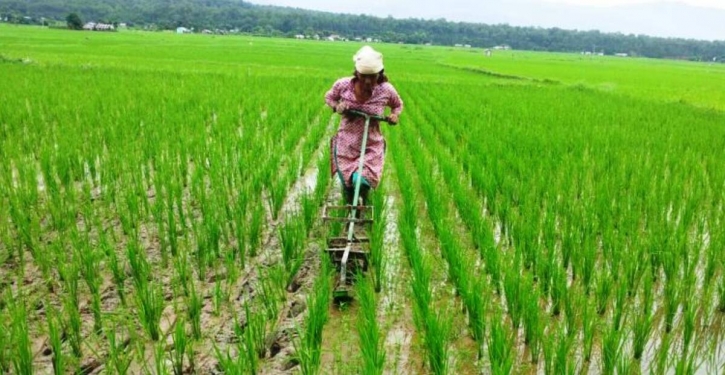Bangladesh to take lease of farmland in Africa to strengthen food security
Asif Showkat Kallol || BusinessInsider

A farmer work in a paddy field in Kenya. Photo: Collected
Bangladesh is undertaking steps to make a journey as far as South and West African countries to plough and make the country food-secured.
Not only that, the government is also planning to ship products to different countries and earn hard currencies for Bangladesh, officials said.
A commerce ministry official said Sudan and Kenya have already expressed their interests in leasing out their farm land to Bangladesh’s entrepreneurs.
“Steps will be taken to provide policy support to involve the private sector in such ventures,” the official who requested anonymity, said.
Apart from this, a roadmap has been contemplated under a tripartite initiative by the commerce, foreign affairs and agriculture ministries to set up an international standard laboratory at Purbachal to test microbiological, environment and other aspects of Bangladesh’s farming abroad.
Some South and West African nations have vast volumes of land but they lack skilled manpower to tilt those land. But, Bangladesh has a pool of skilled manpower in the agriculture sector and that the country has been the world’s largest producer of a number of farm products, including fish and vegetables.
The Prime Minister’s Office (PMO) is reviewing some African nations’ proposals to buy or take lease of farm land, the official added.
“Agricultural products like rice, wheat, onion, pulses, spices and fruits will be produced through contract farming. As a result, the country’s food security will be strengthened further”, he told Business Insider Bangladesh, recently.
According to the minutes of the PMO meeting, foreign currencies will be earned by exporting agricultural products to the third destinations after meeting Bangladeshi demand.
The idea is currently being examined at the government-to-government level. If okayed, some pilot projects will soon be launched in several countries, including Sudan, from next year.
The government of Bangladesh is also requesting the entrepreneurs of the agro-processing industry to come forward and make offshore farm investment.
Special initiatives are being taken to alleviate the complexities of land leasing and labour supply to foreign land.
According to an informal survey, more than 50 Bangladeshi businessmen and investors have shown their eagerness to invest in Sudan and Kenya.
The commerce ministry is going to hold a meeting soon under the chairmanship of commerce secretary Tapan Kanti Ghosh following instructions by the PMO.
A recent letter from the foreign ministry’s Africa and West Asia division stated that Africa has a large amount of fallow land in countries like Gambia, Tanzania, Ghana, Senegal, Liberia, Ivory Coast and Kenya.
In some countries, a number of Bangladeshi entrepreneurs have come forward to invest. However, more policy support is needed to this end.
Besides, the PMO has also instructed the respective three ministers to expedite the verification of the proposal to take lease of overseas land.
The directive was given to the foreign, commerce and agriculture ministers via a recent cabinet meeting.
Cabinet Secretary Khandker Anwarul Islam said several African countries, including South Sudan have proposed Bangladesh that they have huge unused land and some of those could be leased to Bangladeshi entrepreneurs.
Some of the countries have offered Bangladesh to even purchase their land. Fertile farm land could be leased to Bangladesh on an annual basis.
Officials said China, India, Egypt, Pakistan and various European countries have already been making use of the opportunity.
Bangladesh has wasted 10 years due to indecision and lack of initiatives. However, Foreign Minister AK Abdul Momen said that despite the long time wasted, the government is now working on this issue with a positive attitude.
He told a recent seminar that there were some internal and global issues for which the contract-based government-private farming initiative in foreign lands could not progressed much.
























